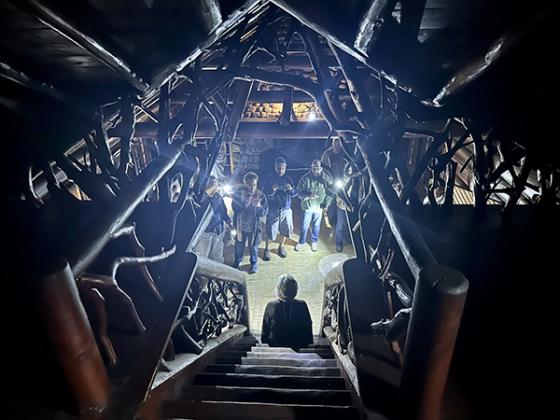By Allison Joy
Jean Mack (seated, center) poses for a photo on the stairwell during a recent tour of the Cooks Run caretaker's cabin. For almost 20 years, until the late 70s, Mack’s grandparents spent summers occupying the cabin and maintaining the 122-acre property that included a fish hatchery. Submitted photo.
IRON RIVER/LANSING — Four months after denying Iron County’s request out of a land deal with the state, the Michigan Department of Natural Resources has expressed its intent to work with the county on finding a path forward to rehabilitating Cooks Run, a former fish hatchery.
Dan Hinch, who leads the county’s Parks and Recreation Committee, said the public use stipulations impeded the county’s pursuit of ways to rehabilitate the property — which includes rearing ponds, a small dam, several outbuildings and a Depression-era caretaker cabin that is listed on the National Register of Historic Places.
“We have had various groups visit the property for their ideas regarding those goals of preservation and development, especially protecting the Depression-era cabin there,” Hinch said of efforts to restore the property. “The reverter clause on the original deed for the property from the State of Michigan was always looming as a roadblock to the excellent ideas proposed.”
As it stands, the entire 122-acre parcel is subject to a reverter clause allowing the state to take over ownership should the property fall into the control or ownership of a private entity, and not maintained for public use. The agreement states: “It is expressly understood that the lands herein described shall be used solely for public purposes, and when same ceases to be used for such purposes, it shall revert to the state of Michigan.”
Over the years, the county has received interest from various entities, including the Superior Watershed Council, on rehabilitating the property.
“The problem has been, at least in the past as it’s been explained to me, they can’t procure the funding without owning the property, and [they] can’t own the property because the reverter will be implemented,” Civil Counsel Steve Tinti explained to the county board in October of 2020, when discussions on how to manage the property first resurfaced.
The property sits just south of US-2 and was formerly operated as a fish hatchery. Built as a public works project in the early 1930s, the property came under ownership of the county in 1961. The Parks and Recreation committee has struggled with grant funding due to matching requirements from the county.


